Role model
As I grew up and learnt about right and wrong and life in general it was very important to have a role model. One that I could go to and talk about the laughter and squealing in the playground and loud screaming voices in the classroom. Adding to the worry and the fear in my head.
And then I go home. It’s like trying to pull a grape skin over a tomato. Shouting in my face, Shhht, I want to hear this doesn’t help you socialise. TV and music can become your role model. When there is a lot of pain, fear and living inside your head. It’s dangerous struggling to adapt with friends, worried about fitting in, no one to go home to speak to about it. Walking way a lisp and talking way a limp.
Feeling worthless, no confidence, drugs dig you an early grave, drink burns your life away, makes you lonely and keeps you on the edge from dealing with things, worried about actions and consequences on the outside. Very loud on the inside, it’s like the largest freight train in the world with no driver.
As we go on in life, hold them, don’t hold them down.
As my adult life continues everything intensifies and jumping from pillar to post helps in ways but not the ways that matter. A learner driver needs a pilot.
I’m still inside my head, so confused by the past trauma and decisions that affects me still in day-to-day life. Trains needs a captain.
I’m still trying to forgive and forget. The harsh fact is that only I can keep the smile on my face and hope that my soul finds the mate that holds me. Every plane needs a co-pilot.
Because if I get held down, I will surely drown in a love that’s not real, no matter what I feel.
A ship needs a pirate in stormy waters.
A soul with no mate is a lonely race to face.
HOLD ME, DON’T HOLD ME DOWN
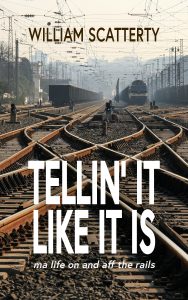
We asked Bill about his book, and why he decided to tell his story.
Future Pathways supported Bill to write a book about his life. He worked with The Book Whisperers to do this. The Book Whisperers are one of our Delivery Partners.
Bill is from the north of Scotland and speaks in the ‘Doric’ dialect that is common there. The book is written in the same dialect. Even if you’re not familiar with Doric, you can still understand the book. It’s called ‘Tellin’ It Like It Is: ma life on and aff the rails’. Bill chose this title because for many years he worked as a train driver.
Bill had often thought about writing a book and when he said this to his Support Coordinator, she told him about The Book Whisperers. Bill says:
“I thought: ‘Why not?’, so Future Pathways put me in touch with Katie at The Book Whisperers, and it just went from there. I told them what I wanted in the book – my own words. It’s my story.”
Bill met with Katie online, over a few months, to tell his story. He has had an interesting life, starting on a farm in Aberdeenshire.
“I’m 72 now, and I’ve lived a good life. I’m a country boy, born and bred. Born on a farm, and all the kids at school were farmers’ kids. When I was 7 years old I’d take the cows in for milking every morning, and milk them myself. The farming then was a lot different to what it is now. Then it would take 6 or 7 men to run a farm. Now one or two can do it.”
So what inspired Bill to write the book?
“The book is my whole life story, from start to finish. I don’t know what people will like about it – that’s up to them. Everything in the book is God’s honest truth. Nothing made up at all. I’ve never done that in my life, and I’m not going to start now. It’s all in there – including the swear words! I don’t just tell people what they want to hear. I tell it like it is.”
Bill now has quite a lot of serious health problems, but this hasn’t changed his approach to life or his sense of humour.
“I go to the hospital every few months to see a specialist. At my last visit, he called me ‘Wonderboy’. I said ‘Why do you call me that?’ He said, ‘Because I wonder why you’re still here!’ I just take every day as it comes.”
Want to know more?
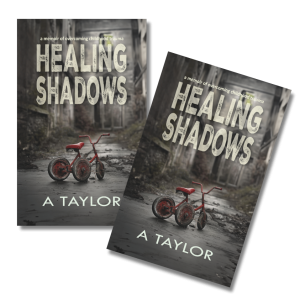
Healing Shadows is a book written by AT, one of the people we support. It is about his experiences growing up in the Scottish care system in the early 60s.
We recently talked to AT about his feelings and how these have impacted his life so far. And we talked to him about his new book.
AT’s journey towards writing his book started in 2018 when he appeared at the Scottish Child Abuse Inquiry to give evidence. He explains:
“I was adamant I wanted to appear at the Inquiry. It was very important for me to do so even though I knew it would be difficult to do so. I wanted to tell my story just like many others. It was very tough and at the end of it, I was given the opportunity to read out a statement I had written. It was very emotional and quite overwhelming which resulted in me breaking down on several occasions. I remember Lady Smith saying to me when I had finished that my “words would not go unheard”. I was very proud of what I had achieved and the KC involved congratulated me and indicated to me it was very powerful.”
The Inquiry had triggered many feelings for AT. AT had built a very good working relationship with his Support Coordinator at Future Pathways. He talked to her about how he had been feeling.
“My Support Coordinator had always been very empathetic and had that natural ability to just listen. As a survivor, sometimes that’s all you need.”
AT continued to be open with his Support Coordinator. He also went to counselling. Over the years, he has managed to get a good insight into his own mental health.
Last year, he told his Support Coordinator that he had always wanted to write a book about his childhood. They both agreed he would make a start and he wrote the first chapter.
His Support Coordinator then put him in touch with The Book Whisperers. They give guidance and support to help people achieve the goal of writing a book.
“I felt there was something unique in putting pen to paper and writing about your feelings on paper. It was very cathartic for me. There were occasions where I needed to step away because it could be overwhelming at times.”
Mary from the Book Whisperers reminded him to take a break after each of their sessions discussing a chapter of the book.
While AT was writing his book it gave him an opportunity to reflect on his life and the journey he had been on.
“Writing this book changed a lot for me. I was putting myself under the microscope. It gave me the chance to reflect where my life was now and where I wanted it to go. I had realised for a long time I had been using alcohol as a coping mechanism. So, in June of this year, I decided to remove alcohol from my life, and haven’t looked back. I realise this decision was part of my journey in reflecting how I wanted to lead my life.”
AT’s writing got lots of praise and this reminded him how he felt in the past when he was given any praise.
“I was never used to getting any positive reinforcement and praise. I just thought people say positive things because they felt they had to but didn’t really mean them at all. But my Support Coordinator from Future Pathways and Mary from the Book Whisperers kept telling me they were blown away with my writing skills. It took me a long time to realise that I had written a really good book, as I had never done anything like this before.”
For AT writing this book brought lots of positive changes in his life. His mental health has improved, he has reduced anxiety and is able to spend time with people in a different way, feeling less stressed.
“My mental health has been in the best place it has been in a long time. Leaving alcohol behind was a massive achievement, but was just part of what I got out of the process. I now have the ability to open up much more than I ever had. I have built up a strength and resilience within me which has always been there, but the writing process helped me to accept me as a person, I feel I am a better version of me.”
Many readers have said the book is inspiring. AT explains:
“I hope my book can give even one person hope to turn their life around.”
AT hopes his story might help others too.
“If someone reads this who has gone through a difficult time, I hope they can see there is light at the end of the tunnel but everyone’s light may be different. Something you might think is a small achievement is actually a massive achievement for an individual. There most definitely is a resilience in being a survivor, although I don’t think we realise how resilient we really are.”
Healing Shadows
Find out more about how gardening helped P to spend time outside, connect with people and feel a sense of purpose.
We spoke to someone we support about his gardening hobby. He uses the name ‘Papa Yap Yap’. It is the name his family call him because he talks so much! Here, we call him ‘P’.
Future Pathways supported P with his gardening hobby. This included getting a polytunnel and gardening equipment. Polytunnels are made from steel and covered in thin plastic. The polytunnel protects what is inside it. The sun heats up the inside of the tunnel and this warms the plants, vegetables and soil inside, helping them to grow.
P started gardening after one of his daughters said that he needed something to take his mind off things. He also thought it might bring him a sense of pride.
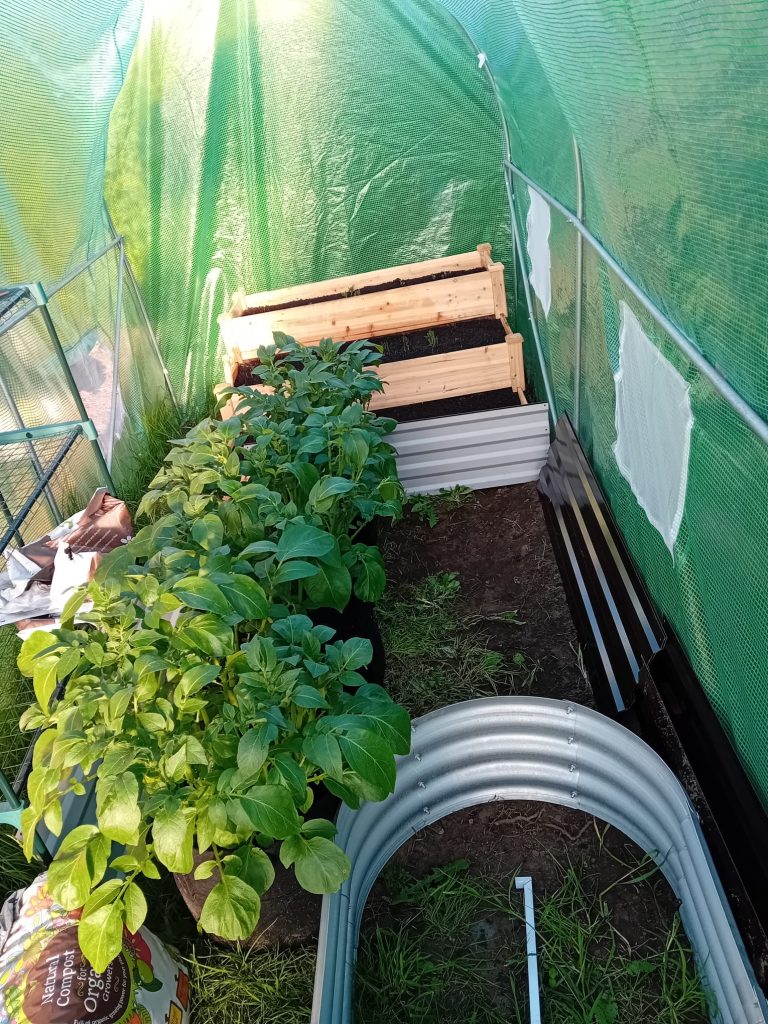

‘I’ve turned my life around. My ‘get up and go’ is now back.’
The new gardening items mean P can now grow his own vegetables and herbs in his back garden. He has grown tomatoes, potatoes, onions, peppers and chillis.
‘Tomatoes are the most difficult. I’m most proud of my tatties because of the way they came out – they were tiny but tasty.’
Gardening also helps P to get out of the house. P needs to look after his vegetables and herbs every day because they need help to grow.
‘I’d rather be in my hut and my garden than in my house. I have to go out because it needs my attention.’
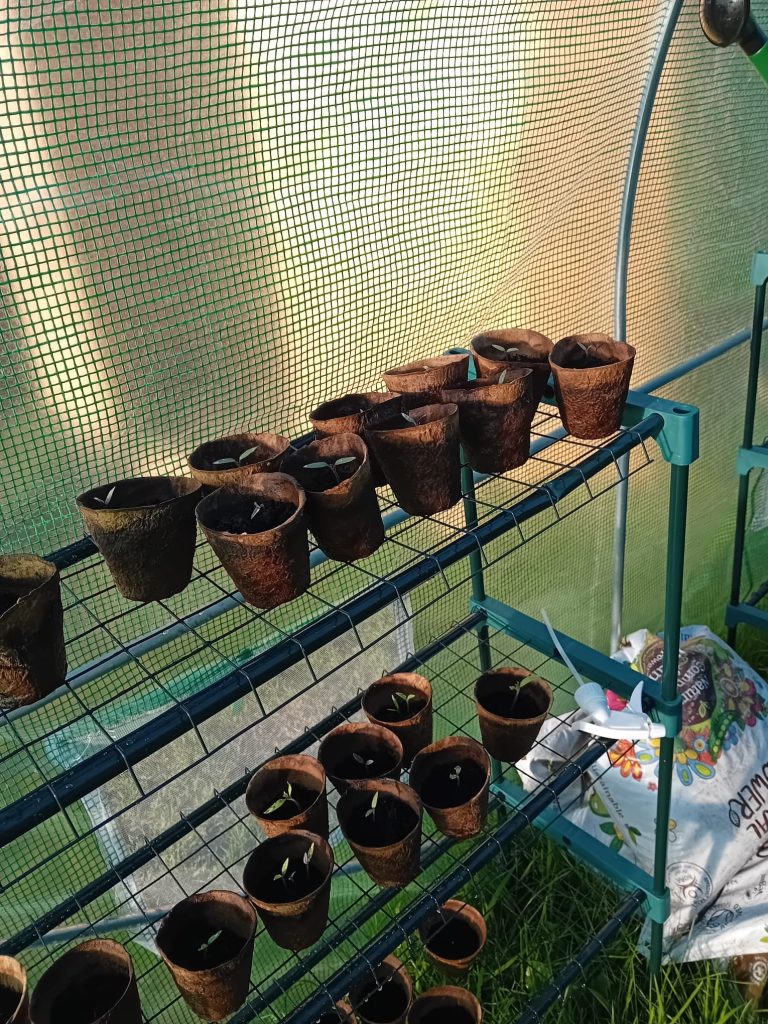
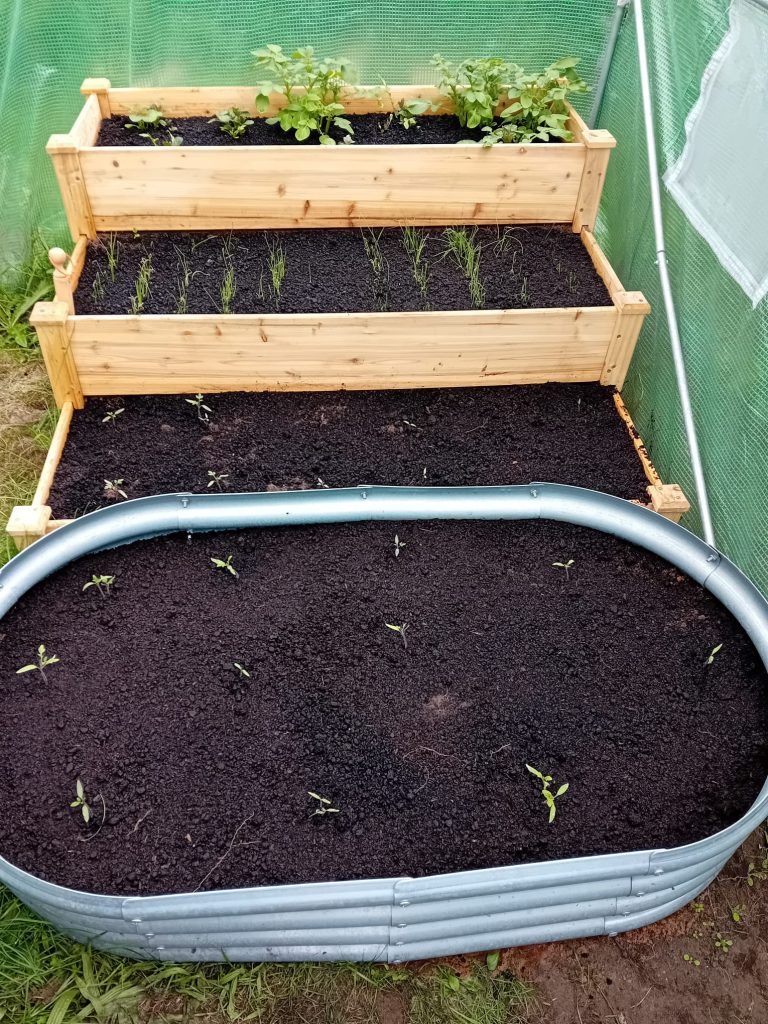
Gardening also helps P to connect with other people. It is something he can talk about with others.
This new hobby has given P a sense of purpose and a feeling of pride. P is hoping to get another polytunnel so he can plant different things. Next he wants to try growing leeks and beetroot.
‘The pride I get is from growing a seed to a plant to giving the vegetables away. I feel I have more purpose. I’ve got a wee glow about me now.’
Top tips
From growing plants at home to taking time outside, being in nature can boost our wellbeing. You can find top tips in our Going Green feature:
www.future-pathways.co.uk/going-green
Here, Trevor shares his thoughts on writing about your own experience.
My thoughts on writing about your own experience
I realise not all who are care experienced would want to write about their own lives which may have been permanently impacted by abuse. The process requires you to revisit painful past memories and look closely at the many ways they still impose themselves onto your life.
Nonetheless, writing and reflection offers an opportunity to gain insight on how you feel and why you feel the way you do in your life now in the present. Writing your story can be a journey toward healing some of your pain and I would advise anyone with care experience to think about writing to gain more clarity.
Future Pathways and The Book Whisperers helped me more than words can explain to record and review my experience. I know from the requests and comments that my story has proven useful to readers. That means my story is worthwhile to me and others.
I would encourage people to get their story out there. It could help you, and it could help another person too.
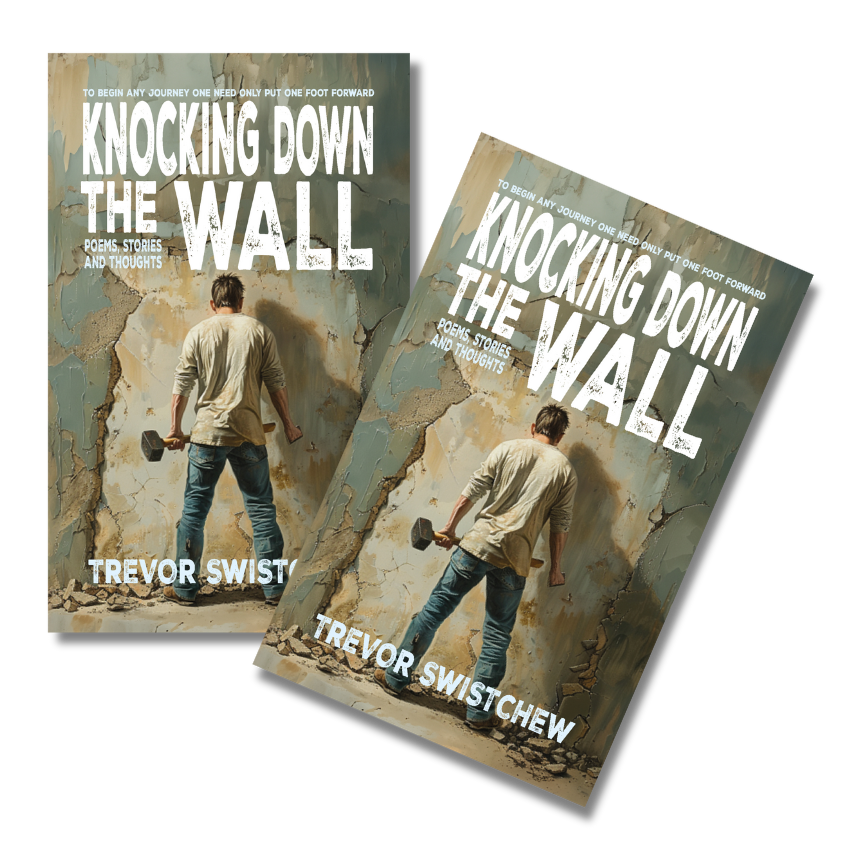
Knocking Down the Wall
Trevor’s latest book is now available. It is called Knocking Down the Wall. It is a collection of stories and poems. In the book, Trevor talks about the challenges of his childhood. But he also talks about his healing journey. He describes confronting and overcoming his past. The book is available on Amazon here.
Discover more
Kirsty is really interested in trying different things that can benefit health and wellbeing. Here, she shares some examples of the things she has tried during her recovery journey.
Bee keeping
Kirsty spent time with bees when she suffered from PTSD (Post-Traumatic Stress Disorder). She found that after only 30 minutes with the bees, she felt very relaxed. She then spent time reading about how bees can help people. She found out that the sound of bees can be helpful to people with PTSD or anxiety and can help to support wellbeing. This is because the bees’ beating wings create a vibration that can have a calming effect.
To find out more about beekeeping, visit www.bbka.org.uk.
Meditation
“I started meditation, something I found extremely difficult. My panic attacks would result in me being unable to focus on my breathing to get into a meditative state. I persevered and eventually was able to use meditation as a way to calm my mind.
I encourage anyone experiencing difficulties coping in life to try and meditate. Even baby steps are still steps. I can guarantee you will find your peace. You will learn to love yourself and not care what the rest of the world thinks of you, because only your opinion will matter.”
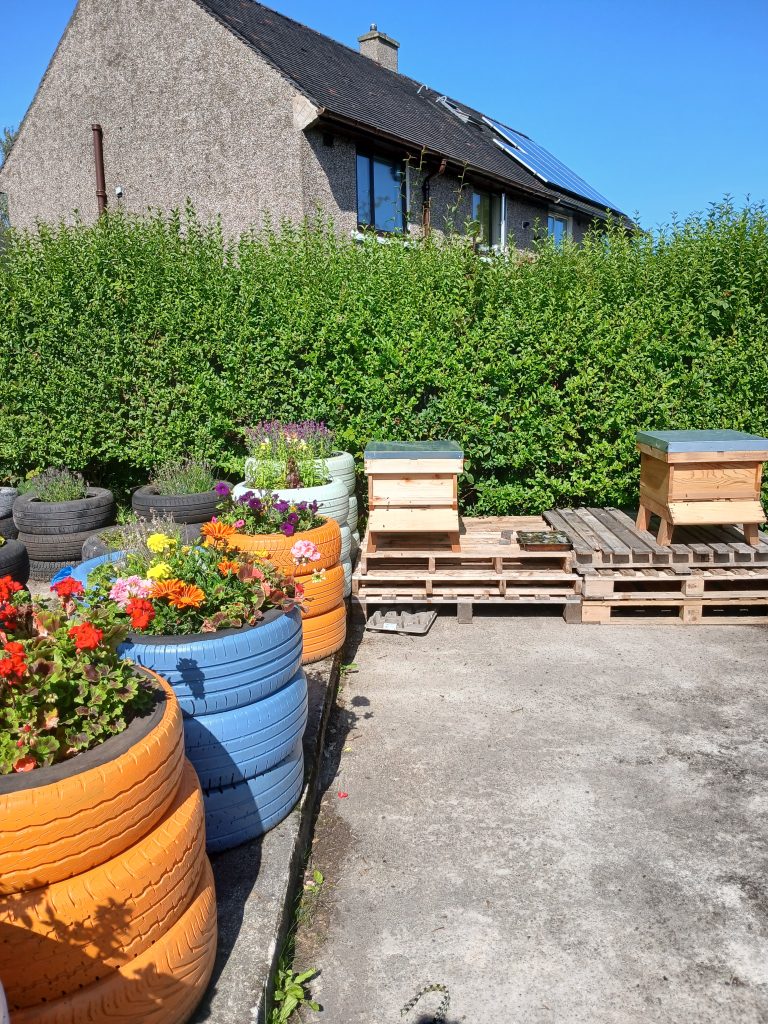
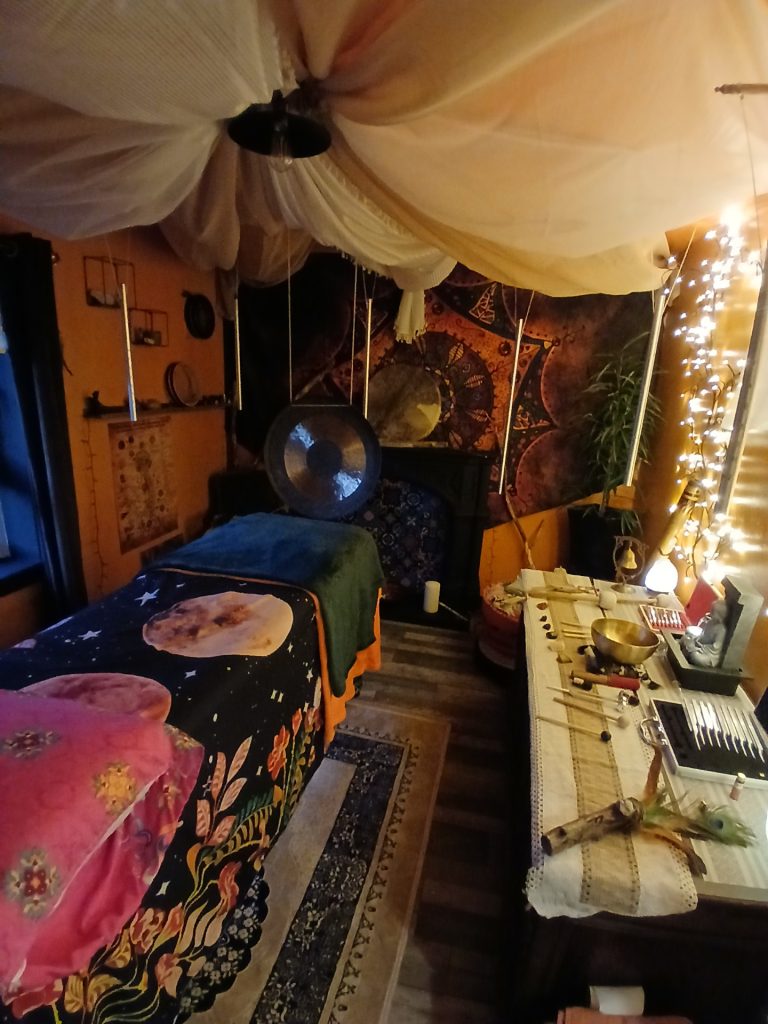
Above: Kirsty’s beehives and her sound therapy room
Sound therapy
Sound therapy uses vibrations. Kirsty uses instruments like drums or gongs that make powerful vibrations. This means she can feel the vibrations in her body.
‘It opens up the body like a ripple effect of a stone in a pond.’
She also uses something called binaural beats. This is when you listen to two tones with slightly different frequencies at the same time.
“These methods sync both hemispheres of the brain and take you to deeper levels of meditation. This led me into digging further into the science behind frequencies and vibrations. I like to understand the science behind why these methods work.
Seeing fast results, these methods allowed me to meditate and open myself up to the traumas in a calm, non-evasive way. Almost not even knowing that this is what I was doing. I was able to pick away at traumas without even really feeling them. Able to look at them without emotional attachment. Healing myself bit by bit without having to face the enormity of it. I began to really get to know who I was behind all my usual barriers.”
“One day you will get there, and it will be yourself who gets you there.”
Sharing her learning
Kirsty wants to create a place where people can try sound therapy, meditation, bee-keeping, or even all three.
“If I can give something back, this is what I want to give back:
- a way for people to heal without having to return time and time again to professionals
- to let people know that they can do this themselves
- and to give people the experience and the tools to walk away after a couple of sessions equipped with the knowledge of how to self-heal.”
Next steps
“My plan is to start my own business using instruments that create sound waves and vibrations that resonate with the mind and body. To take people through meditations, safely showing them every step of the way how and why to do this. Ensuring that they don’t need more than a couple of treatments maximum so they can take it away, practice it and find what works best for them and show others how to heal themselves.”
Kirsty is also working with Graham Wells who runs GroWiser. GroWiser is a financial coaching service and one of our Delivery Partners. Graham is helping Kirsty think about her business plan.
“He’s more than a financial coach – he’s like a life coach. Not just immense help with finances but also encouraging and cheerleading my ambitions.”
You can read more about Kirsty’s experience of recovery at: www.future-pathways.co.uk/kirstys-experience
You can find out more about GroWiser in our Meet the Partner interview at: www.future-pathways.co.uk/meet-the-partner-graham-wells
Daniel had a serious accident over 10 years ago and was paralysed down his right side. Here, Daniel shares how exercise improved his physical and mental health, and helped him on his recovery journey.
I was determined to get back functioning and active again. I went to physiotherapy. They used to come and get me to go to my appointments. I was ashamed of people seeing me the way I was. People made fun of me.
Eventually, I started doing exercises in the house and I kept on doing them every day. I did butterflies and half butterflies, shadow boxing and knee bends. I did 20 repetitions each, twice a day. This helped with my counting as well.
I started feeling a bit of a difference, could see I was getting stronger.
During this time I was also in recovery from addiction and dealing with lots of personal issues but I kept exercising all the way through. Over time, I was able to use a mobility scooter to get back out and about.
Eventually, after Covid, and when I started with Future Pathways, I also started going to the local Recovery Cafe. We were all talking about the nervous system and how exercise is good for improving it. From there I thought I would give swimming a try.

Then, some friends encouraged me to do a round of golf. I’m now able to hit every single ball. There’s been people encouraging me and I really appreciate that when I look back. I try to encourage other people in recovery to go swimming and to take up golf and other exercise because of how it’s helped me.
I enjoyed doing all of these things but I also wanted to be able to do something on my own. I wanted to go out when I felt like it to exercise and not be dependent on recovery groups, or other groups or other people.
I wanted to have the freedom to exercise like everybody else.
I’d starting thinking about cycling when I got my mobility scooter. Once I felt stronger I bought a bike but I kept falling off because of my balance. I talked to my Support Coordinator at Future Pathways about options for cycling and we thought about a trike/recumbent bike. This is a bike with three wheels that you lean back on instead of sitting upright.
We went through to Edinburgh to try some out… I thought to myself, “this is it, this is what I want, this is what I’d like to do”. It made me feel good, gave me a sense of freedom and enjoyment.


The day I got the bike, I cycled back to the train station on it and my Support Coordinator walked alongside me. I was a bit anxious getting it on to the train. I couldn’t believe it. I really couldn’t believe it. Things like that don’t happen to people like us. Anything good, people usually take it away from you.
On my street on that day, people from my local town were giving me encouragement, smiling and laughing with me. That was different – laughing with me and not at me. People were happy for me. People have told me I’m a miracle. I’ve walked from Bathgate to Whitburn – that’s because of building up my strength on the bike. I want to keep building up my walking too.
The bike has been a godsend. I’ve done over 200 miles on it now. I’ve been to Bathgate and back. Whitburn, Blackburn, Bathgate, Armadale and back to Whitburn. I’ve also been to Harthill from Whitburn, up to Fauldhouse, Longridge and back to Whitburn. When I’m out I see people smile and cars going by give me a wee toot.
It’s not just made a difference, it’s made a life-changing difference.
My physicality is developing, my confidence has grown and I’m hoping it will grow more. I find it hard to talk to people. I’m practicing this and sometimes the bike helps with having something to talk about when I’m out.
I think it helps with different things and it’s given me ideas for doing more. I’d like to do a Glasgow or Edinburgh cycle to raise money for a parachute jump. It’s got me thinking of what else I can do. I want to get other people into recovery. Maybe even volunteering one day.
I’m looking for contentment and to be stress-free. I’ve been in trouble all my life. The bike puts a smile on everybody’s face – that makes me feel a bit happier as well.
This article is a shorter description of Daniel’s experience. You can read more about his journey in the full article at www.future-pathways.co.uk/daniels-experience
Rikki shares his experience of opening up.
On a Tuesday morning in June, I was visiting Carlisle Cumberland University Hospital to have a blood pressure monitor fitted. As I sat waiting for the ambulance staff to come and take me to the cardio-respiratory investigations, Chris saw me and made the sign of ‘it’s OK to talk’.
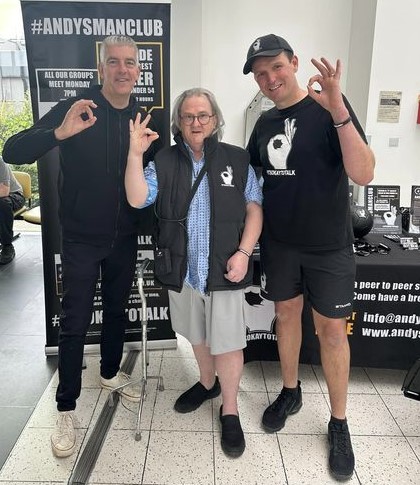
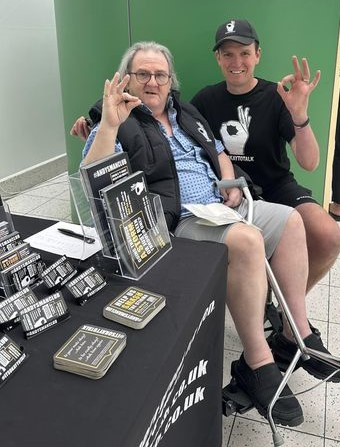
Chris is from Andy’s Man Club. They are a charity that offers support groups. The groups help men with their mental health through the power of conversation. I’ve been attending their online meetings every Monday since leaving hospital at the end of March. Having a stroke made me angry and frustrated. What’s my life going to be like now? Assisted to walk, dress and even to wash, with nursing staff coming to my house twice a day.
Of course I had dark thoughts going through my head.
I have had tougher times in my life. I could still talk and walk and decided to find out more about Andy’s Man Club. I thought I would give it a try and see if I could take a leap into understanding my anger.
I set up my computer and joined a 2-hour Zoom call with 14 other men, opening up to one another. There were lumps-in-my-throat moments. I was only thinking ‘what had I done to deserve what had happened to me?’ I felt so embarrassed and scared, but I spoke with a dry throat and a twisted mouth and no teeth. And I just let everything out.
Yes, it was the taste of my hot tears that flowed down my crooked cheeks. And then I began to embrace being listened to and not feeling lonely. There were so many thumbs up and applause hands. I knew that I could get through what the world was going to throw at me.
It is 6 months since my stroke and I take everything that life throws at me and smile, and that little voice in my head says, ‘You’ve got this Rikki.’
Andy’s Man Club offers free peer-to-peer support groups for men across the United Kingdom. Groups are both face-to-face and online. They aim to end stigma about men’s mental health through confidential, judgement-free spaces where men can open up. Find out more at www.andysmanclub.co.uk
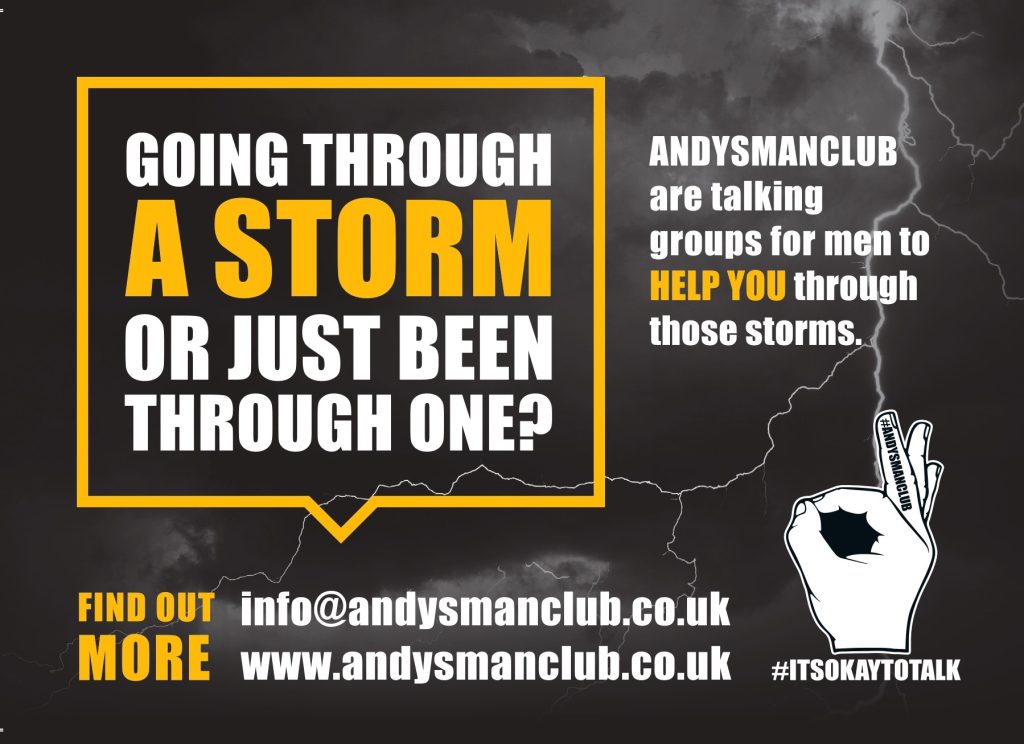
Pauline shares her experience of using her voice to improve services, support herself and help others.

Voices for a Better Future
Pauline is part of Voices for a Better Future. The members of this group have been supported by Future Pathways. They are a lived experience group.
The group offers guidance and advice to Future Pathways. They make sure that the service always considers the views of the people we support. Three of the members of Voices for a Better Future are also on the Alliance Leadership Team, which runs Future Pathways.
“I am part of Voices for a Better Future and the Alliance Leadership Team. I believe that any person should have the right to raise an issue with Future Pathways that they are concerned about. Maybe you don’t feel you can raise it or don’t know where to go. But the people on the Leadership Team do care. We want to do the right thing. I got involved because I wanted to know more, to try to help influence policy and to help to get the ball rolling.”
Volunteering
Pauline also uses her time to support children and young people who are carers. This started in lockdown.
“I got my qualifications during lockdown for working with kids who were young carers. These kids needed a rest during lockdown and I thought if I could give them a voice, I would, and I did. They were amazing kids with amazing ideas. I got thank you cards from lots of people because of the work I’ve done. I don’t always realise it myself. Sometimes if you can’t do something for yourself, doing something for someone else is enough and that can help you too.”
Connection
“I’ve moved in to disabled accommodation now. It was a horrible thing to happen but it is a lovely house and I got a lot of support from a woman from a third sector service. I was connected to her by Future Pathways. What a journey we have been on!”
“Future Pathways also supported me to get a computer and I worked with a wonderful Support Coordinator. I got my computer set up and got myself online. All these things I’ve been doing have come out since I joined with Future Pathways. Having a computer means I have that lifeline, that link – I can take part in things. I’ve been given the chance to give back a little bit and help other people. And it’ll keep going. And we can only make it better.”
Who Cares? Scotland
Who Cares? Scotland is Scotland’s only national independent membership organisation for Care Experienced people. They campaign for the rights of Care Experienced people.
“I’ve been involved with Who Cares? Scotland since I was 14 and I’m now in my 50s. When I was young, I joined and went along because you got free juice and crisps. Then it became about the people, then it became about what the people were trying to do. It does make me cry with pride when I see how well Who Cares Scotland is doing since I’d been that little kid.
“I know things have improved since my generation and things are different now. But there is still stigma, problems, fragmentation, the feeling of not fitting in and lack of connection. It’s important to keep improving services for care experienced people – that is my view and in my heart of hearts, and what keeps me ticking along.”
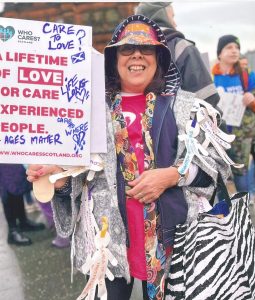
Applying to Scotland’s Redress Scheme
“I gave it a lot of consideration. It wasn’t about the money. It was about feeling validated,
listened to, heard. Yes, we are ‘victims’ – I know a lot of people don’t like that word. But when I was that child, I was a victim. Now I might be called a ‘survivor’. It was very difficult to apply to
redress. And a lot of people don’t know that they are entitled to it, or they know but don’t want to interact. When you’ve been conditioned not to have a voice, it’s difficult to think you do.”
Writing
“During the redress process, I wrote a book for myself which was a therapeutic journey. And thanks to Future Pathways, it can now go to print. I love my writing. I did a peer-to-peer writing group and ended up facilitating it for three months. I write my way out of trouble and that’s how I’ve always done it. The thing about writing – the beauty of it – is it can be anything you want it to be. It allows you the space to think. You can think about what you’ve written and why you’re writing it.”
The recovery journey
“It’s important to know that recovery can be slow, and happens only when you’re ready and when you want to engage. Getting support means you can get the tools to help you. But it’s up to you to make good use of them. Everyone has a toolbox and needs to keep adding to it. Throughout this, remember your achievements. And finally, what else has helped me is music. I would suggest listening to ‘The Climb’ by Miley Cyrus, ‘This Is Me’ by Keala Settle and ‘Ten’ by Nathan Dawe.”
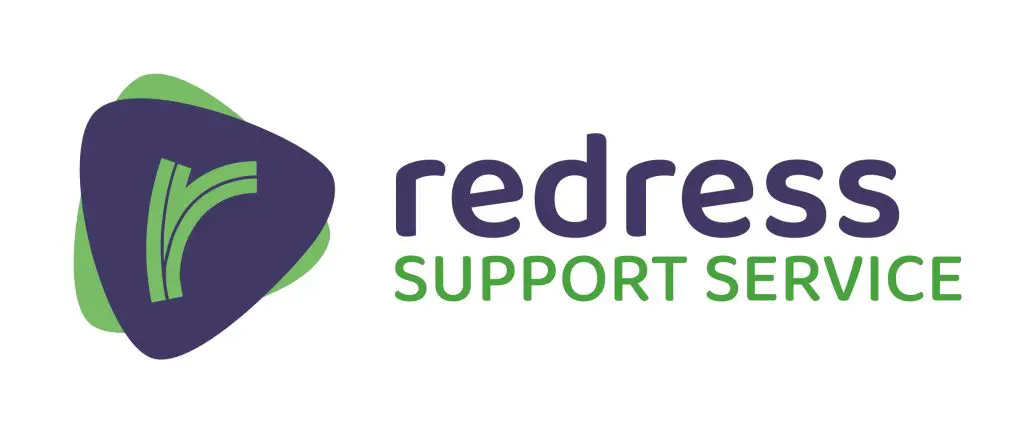
If you are applying to the Scottish Government’s Redress Scheme, or if you are thinking about applying, the Redress Support Service is there for you. The service offers support to people on their redress journey. Find out more at www.redress-support.scot
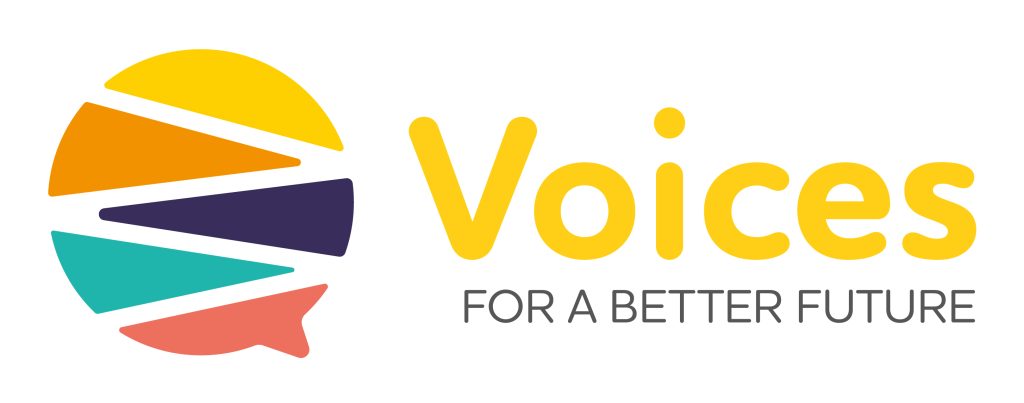
Future Pathways’ lived experience voice group is a safe space where members can offer guidance and advice to the Alliance Leadership Team and influence aspects of the design and delivery of Future Pathways. Find out more about the group and their work at www.future-pathways.co.uk/who-we-are/voices-for-a-better-future
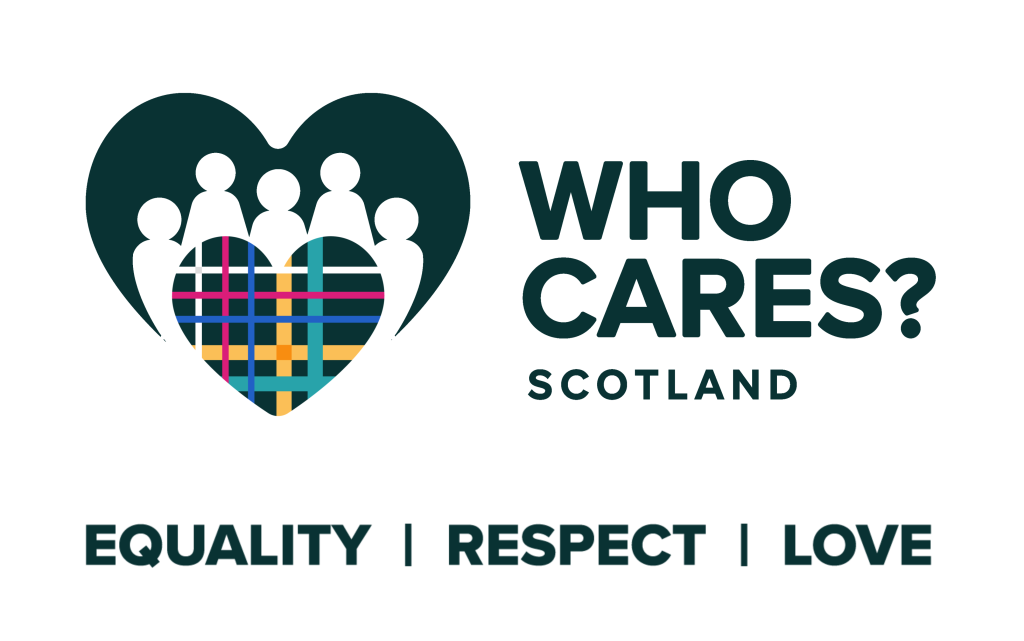
Who Cares? Scotland is Scotland’s only national independent membership organisation for Care Experienced people. Their strategic vision is to secure a lifetime of equality, respect and love for Care Experienced people in Scotland. At the heart of their work are the rights of Care Experienced people and the power their voices have to bring about change. Find out more at: www.whocaresscotland.org
Under that Caledonian Sky
The many shades of purple hues and the russet
and golden ambers
Burn bright in that morning light
The morning call becoming deafening
As each bird trying to be heard.
I smile… what a glorious sound and vision I wake to
The mist is up the glen now, showing more of the hillside’s glory
The dark bracken mingles with the multi-coloured flowers and heathers
That are searching for that morning sun.
Oh, what a bonny sight to see
It evokes emotions that awake you
Ready for the hearty breakfast smell that is wafting into my room
It’s a shame I’ll never walk under those skies again.
So I say my farewells
Oh glorious Caledonia sky
Farewell, farewell.
But I know you will never be lonely
You’re too beautiful, a sight to behold
So go, you lonely traveller
And lie under that Caledonian sky.
Eileen has published a collection of poetry. It is called ‘The Nightmares and Dreams of a Broken Wee Lassie’s Life’.
You can buy the poetry book on Amazon and from Waterstones.
Eileen is also working on a second book which will soon be published. Her story is made up of 5 books in total.
